Introduction to Goma Tofu
Goma Tofu or Sesame Tofu is a traditional food in Japan. Although it has the name tofu, it is different from tofu made from soybeans. Goma tofu consists of sesame and using kudzu to make kudzu powder. Locals make this by grinding sesame into a smooth paste, combining it with water and kudzu powder, and heating it until curdling occurs.
Along with Wakayama style ramen or Wakayama ramen, Goma tofu is also one of Wakayama prefecture’s specialties. Locals usually eat and serve this chilled. Additionally, they used it as an ingredient like tofu. Consequently, many say that to match the strong flavor of sesame oil, you should add wasabi soy sauce or soup stock. Now, let’s get to know Goma tofu even more as we go through this article.
Etymology
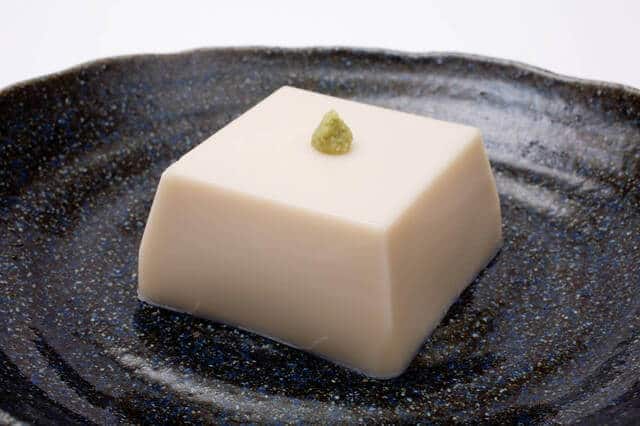
Goma Tofu (胡麻豆腐) has two root words– “Goma (胡麻)” and “Tofu (豆腐).” Goma means sesame and many used the term tofu by extension for similarly textured curdled dishes that do not use soy products. Overall, many know it as “Sesame Tofu” in literal translation.
What is Goma Tofu?
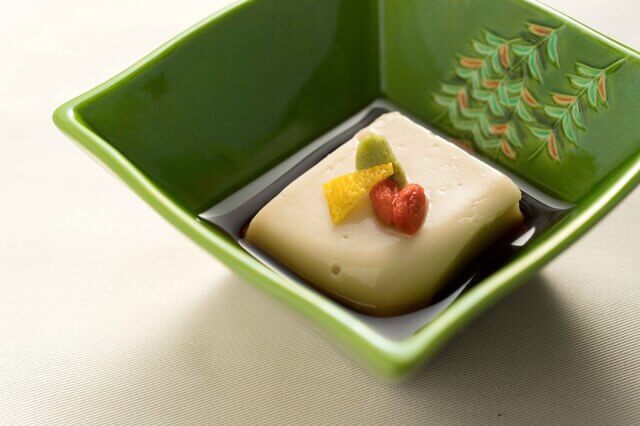
Goma Tofu or Sesame Tofu is a traditional Japanese food in Wakayama prefecture, Japan. It is one of many side dishes served at the beginning of the meal in Shojin Ryori. Shojin Ryori is a traditional vegan or vegetarian dining style practiced by Buddhist monks in Japan. It contains mainly vegetables and grains. It doesn’t contain any meat or fish. Strict Buddhist monks have compassion for all living things, so they don’t eat meat or fish.
Traditionally, Goma tofu consists of dashi, sesame seeds, and kudzu starch. It uses minimal ingredients for maximum flavor. It is quite different, unlike any other tofu. Because instead of using soybeans as its raw materials, locals use sesame and kudzu as the main ingredients in making one. They grind the sesame into a smooth paste, combining it with water and kudzu powder, and heating it until curdling occurs.
It doesn’t have the same texture as tofu but rather a pudding-custard-like texture. Consequently, it is different from Agedashi Tofu which is a popular Japanese dish made of deep-fried tofu in a sweet and savory sauce.
Origin of Goma Tofu
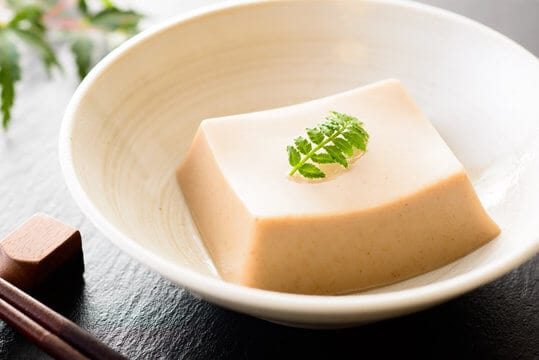
Theories state that Goma tofu has been born as one of those devoted dishes one needs to eat during rigorous training on Mt. Koya. Kobo Daishi (Kukai) opened this kind of training about 1200 years ago.
Sesame is a very nutritious food, and long ago, they used it as a medicine in China. Kobo Daishi, who went to China for a mission, brought it back to Mt. Koya and started cultivating it in Japan. Hence, Shojin Ryori does not use meat or fish, and tends to be deficient in protein. Therefore, they supplemented their nutrition by eating sesame seeds containing high-quality protein.
Later on, Goma tofu or sesame tofu became mainstream and they efficiently consume sesame nutrients. They just remove the raw skin and without roasting sesame seeds then, mixing it with the water from Mt. Koyasan and kudzu powder. Afterward, they knead it in a mortar and cook it.
There is also a theory that “Ma Tofu” originated from “Japanese-Chinese Shojin Cuisine Shoten” published in 1697. In the Showa era, it became widely known as a souvenir of Mt. Koya. Currently, it is one of the standard Japanese dishes. It was indispensable as a devoted dish for monks who practiced on Mt. Koya. Even today, it is a classic shōjin ryō that the Japanese serve at Zen temple meals such as Mt. Koya.
Goma Tofu Recipe
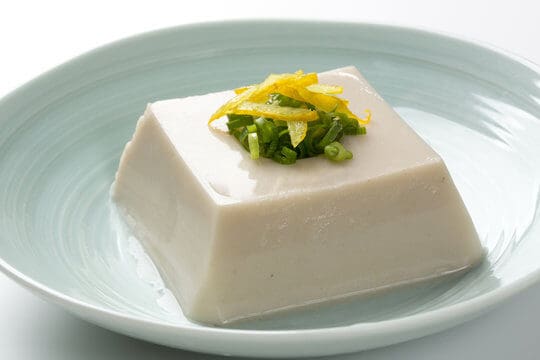
Traditionally, Goma Tofu recipe sticks with three simple ingredients: ground sesame paste, water, and kuzu roots for making kudzu powder.
How to make Goma Tofu?
Goma tofu is one of the best known Shojin Ryori dishes. You can make Goma tofu although making it from scratch is hard. Kudzu powder is difficult to process from kudzu roots, and the sesame has to be ground for a very, very long time in order for it to become totally smooth.
Firstly, roast the sesame seeds and grind them in a blender. Then, put it in a mortar and grind it again until the oil comes out.
Add water to sesame seeds, put in a strainer bag, and squeeze out the oil. Transfer the squeezed juice to a pan, add kudzu and stir well until it dissolves in a wooden rice scoop.
Cook over medium heat for 7-8 minutes while stirring patiently. When it is firm enough, put it in a water-moistened sink and let it cool.
To serve, place a square of Goma tofu in a small bowl. Spoon a little sauce over the Goma tofu and garnish with a dab of wasabi paste.
How to eat Goma Tofu?
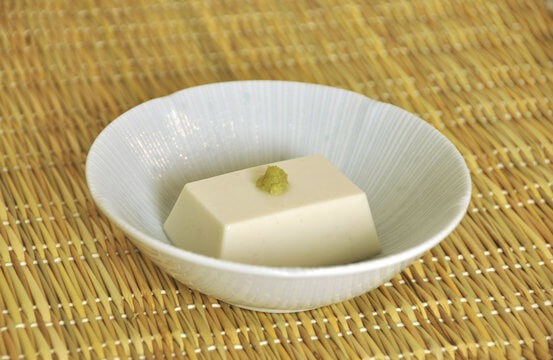
If you are wondering how to eat Goma Tofu the right way, then I will guide you through it. Locals eat Goma Tofu on its own and are not used in other dishes, because it has a distinctive strong flavor from the contained sesame oil.
When eating, like cold tofu, it is typically dressed with soy sauce and garnished with wasabi. Additionally, by dousing it with “Kuromitsu (黒蜜)” black syrup or honey, and dusting with “Kinako (きな粉)” roasted soybean flour, you can enjoy Goma Tofu as a dessert. Consequently, Goma Tofu pairs perfectly with sweet miso too.
How many calories are there in Goma tofu?
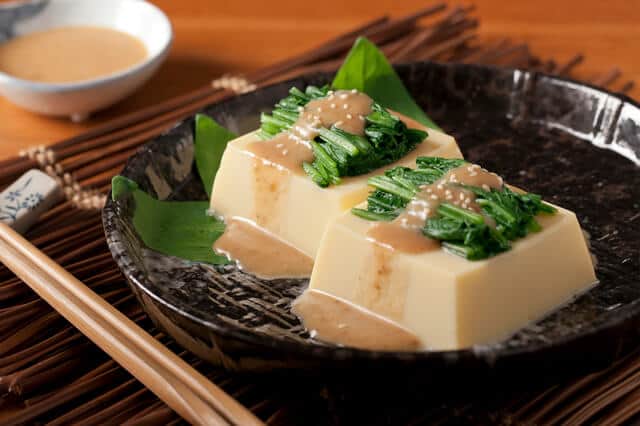
The % Daily Value (DV) tells you how much a nutrient in a serving of food contributes to a daily diet. There are 140 % DV calories in a serving of Goma Tofu.
Can you take too much kudzu root?
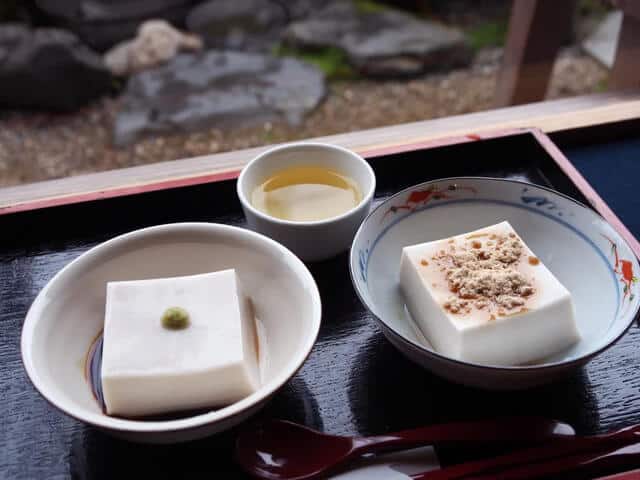
People have used kudzu root in Eastern medicine for many years. More recently, kudzu root has made its way to Western countries as an herbal supplement. Some studies suggest kudzu root may help treat alcohol use disorder or alcohol dependence.
However, there is also some evidence that kudzu root dietary supplements may cause liver injury. One study in mice found that taking 10 mg per day of kudzu root extract for four (4) weeks caused liver toxicity. In theory, kudzu might make liver diseases, such as hepatitis worse. People with liver disease or a history of liver disease should avoid too much intake of kudzu.
What is the nutrition and effect of sesame?
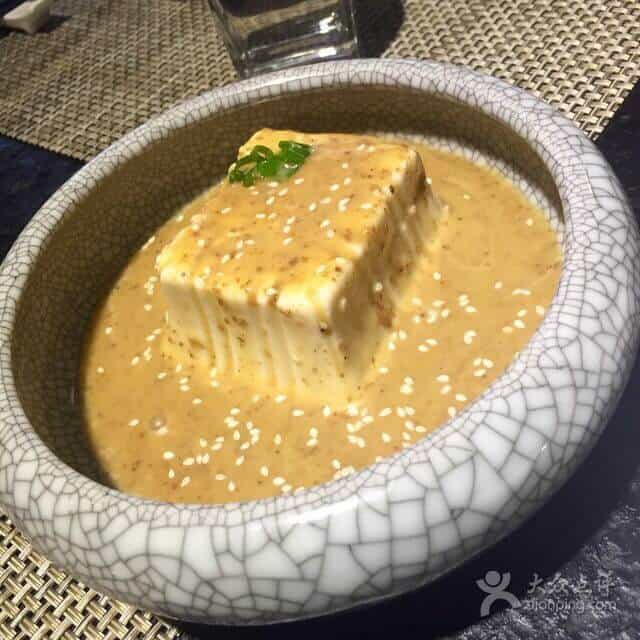
Sesame seeds, even with just a small grain, have plenty of nutrition. Many know it as a good ingredient for health and beauty for a long time. In addition to protein and dietary fiber, sesame contains a good balance of minerals such as calcium, magnesium, and iron that are difficult to get in your normal diet. Among them, it has an antioxidant effect and is rich in vitamin E that supports rejuvenation and an ingredient to have an anti-aging effect.
Recommended Goma Tofu Restaurants
Since the Meiji period, the Japanese call Koyasan as the Kongobuji Temple, and “Danjogaran” and “Okunoin” are the two sacred sites they consider. It is one of the World Heritage Site in 2004 and received three stars in the Japanese version of the Michelin Travel Guide. Among the Goma tofu in Japan, Koyasan’s sesame tofu is exquisite and very popular.
Kadohama Goma Dofu Sohonpo
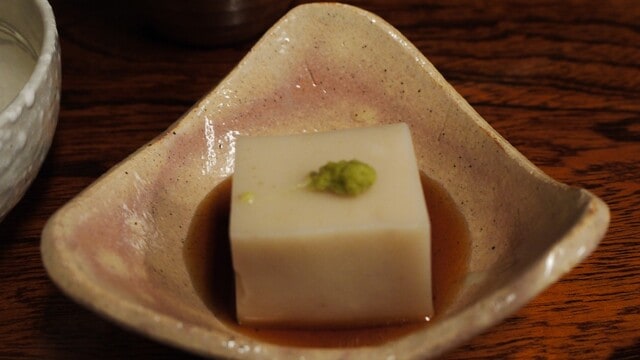
It is a long-established store founded in 1890. In the present time, they still manufacture Goma tofu without using additives by using the traditional manufacturing method at the time of its founding. Customers can buy it by mail order, department stores, and souvenirs from Koya Yamauchi, but the shop recommends the “raw sesame tofu” that is only available at the main store. It is popular because you can feel the umami of sesame and the goodness of it melting in your mouth.
Hamadaya
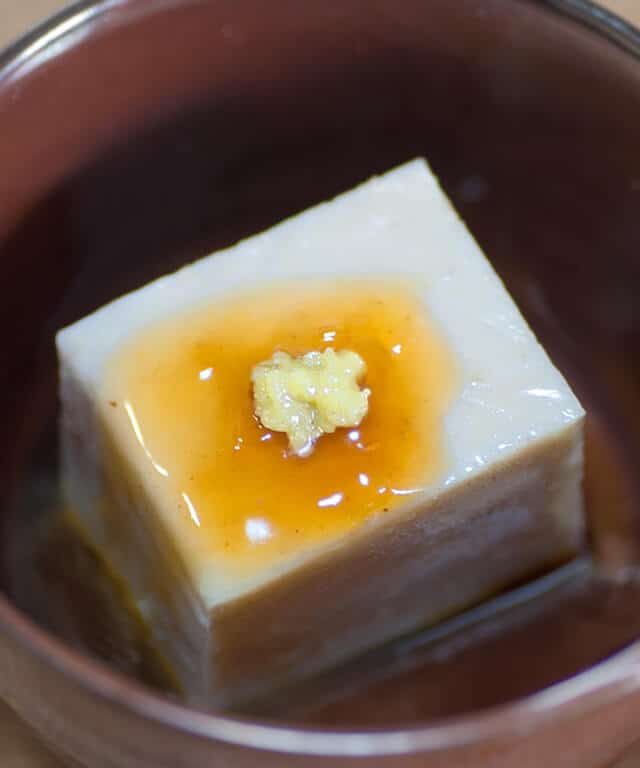
The shop opened around the 10th to 20th years of the Meiji era and initially manufactured cotton tofu, but now it only manufactures sesame tofu. Additionally, if you don’t have a cooler bag or an ice pack, you can’t take it home. It is safe to have them prepared at the shop for a fee.
In the store, you can get “Wasabi soy sauce” and “Wasanbon sugar” for 300 yen each. Wasabi salty soy sauce is popular, but most customers recommend Wasanbon. The elegant sweetness of Wasanbon and the fine Goma tofu go well together and are delicious.
Morishita Shoten
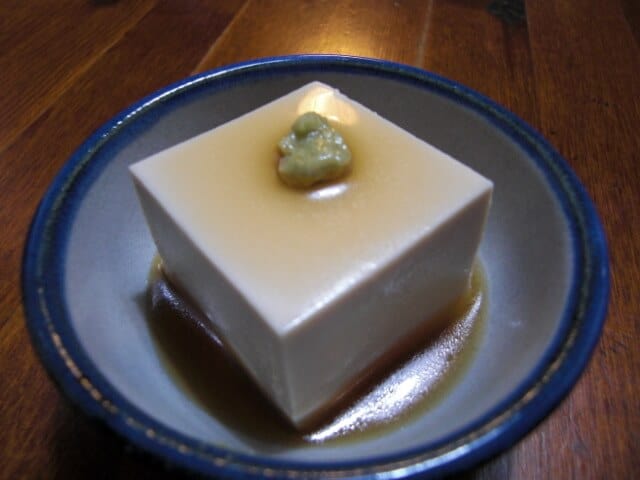
Many customers recommend trying the shop’s raw sesame tofu. They say it has a good flavor and taste. The menu they have here is Goma tofu or sesame tofu only, and they are raw and packed. This shop sells it without an ice pack or a cold bag but depending on the season and temperature. The raw sesame tofu is easily sold out in the afternoon, so you should go here earlier to have it.
Kurama (Tokyo)
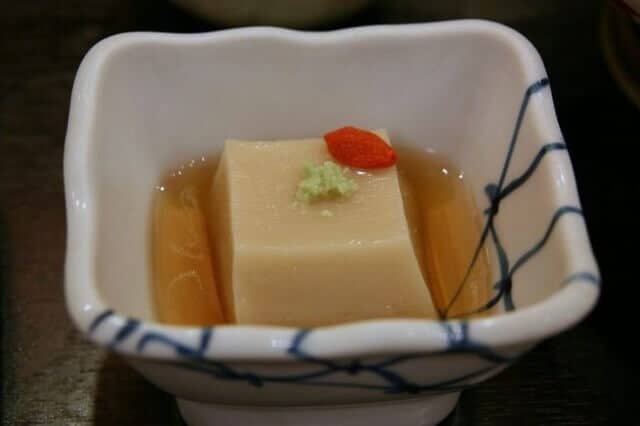
This next shop that I will introduce serves three kinds of sesame dishes that range from ¥450 to ¥3000. They proudly recommend their handmade sesame tofu. The shop says that they make it by carefully kneading sesame and kudzu. It is an exquisite dish with a smooth texture, melty mouthfeel, and rich sesame seeds. It is a beautiful treat with seasonal vegetables.
Bonmi (Tokyo)
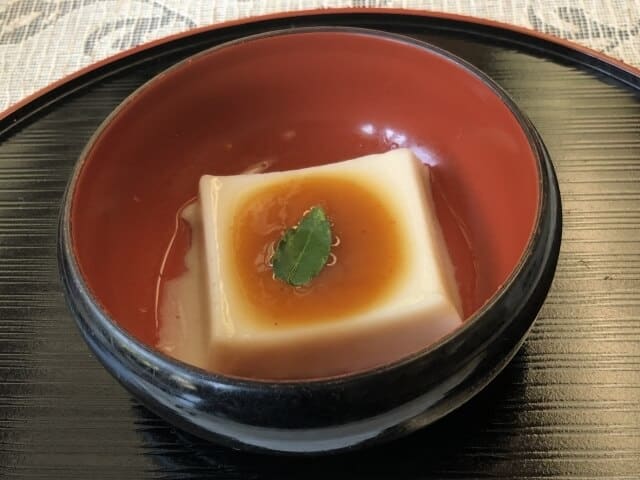
The Goma tofu here is a specialty of this kind of Kaiseki restaurant. They usually remove the skin of raw white sesame seeds then carefully squeeze and knead the pure white sesame tofu. Afterward, they sprinkle the roasted white sesame sauce on it. Customers say that it has a smooth melting in the mouth and its deep richness is unforgettable once you eat it. It seems to be a souvenir for elderly people.
Conclusion
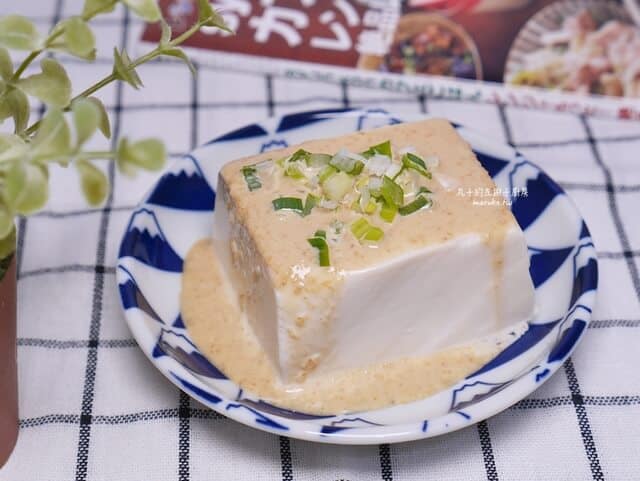
Tofu is a huge part of Japanese cuisine and there are so many different variations of tofu available in Japan. In Wakayama prefecture, there is a known Mount Koya or Koyasan, a large mountain serving as the headquarters of Shingon Buddhism. Here, they practice what they call Shojin ryori. Shojin ryori, otherwise known as Buddhist cuisine, is a plant-based, vegetarian meal eaten in Japan by monks. This traditional cuisine features rice, miso soup, and a variety of vegetable and tofu side dishes. Consequently, Goma tofu or otherwise known as Sesame tofu is an example of this. If you ever go to a Buddhist temple or restaurant, they’ll make the Goma tofu from scratch: grind their kudzu, sesame seeds and make their dashi. But for making it at home, you can do one with store-bought starch, pre-made sesame paste, and kombu dashi granules.
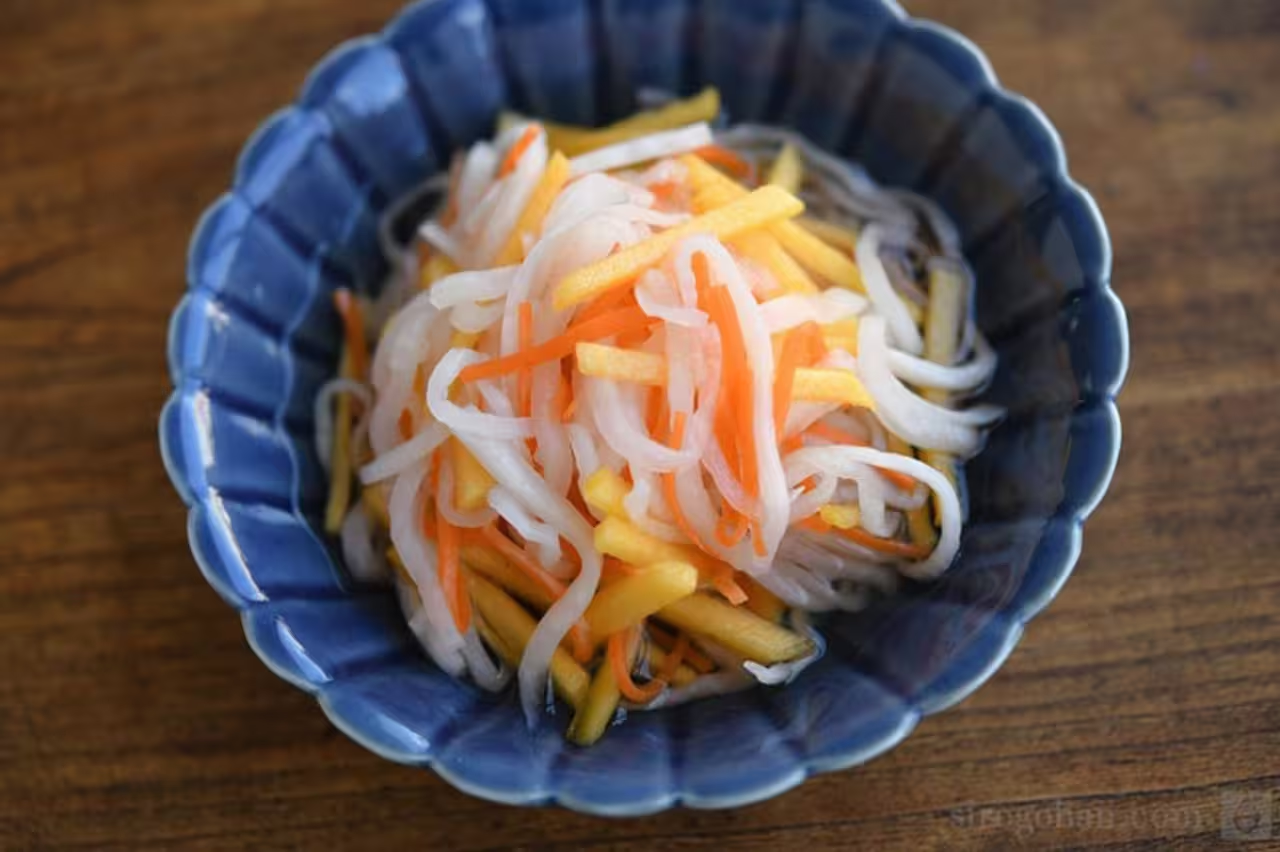
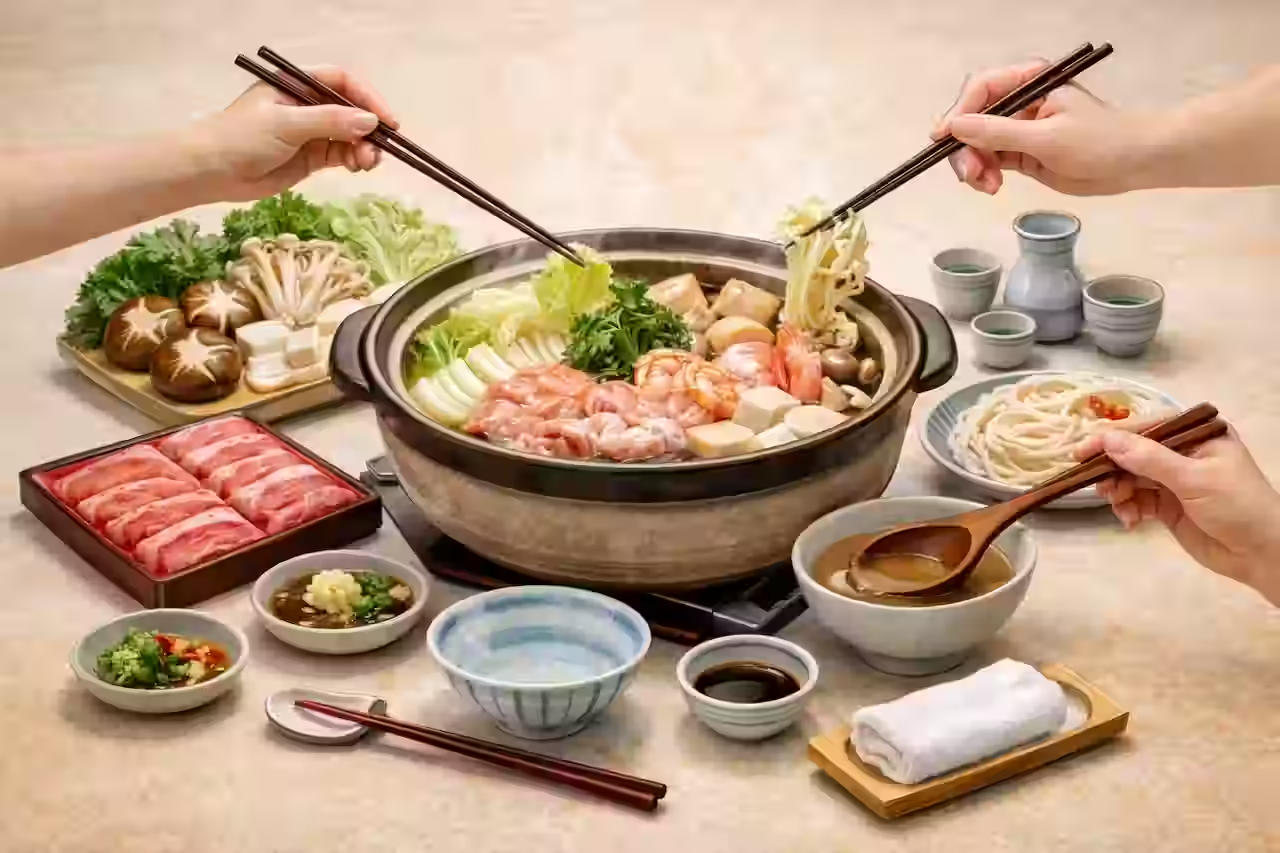
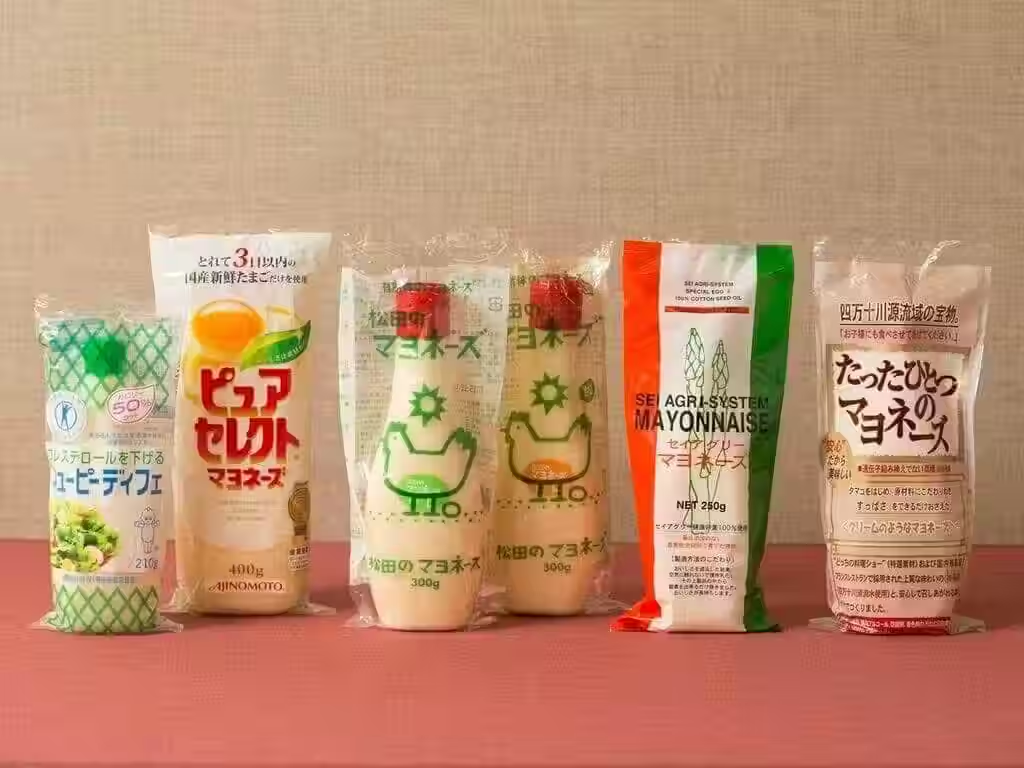
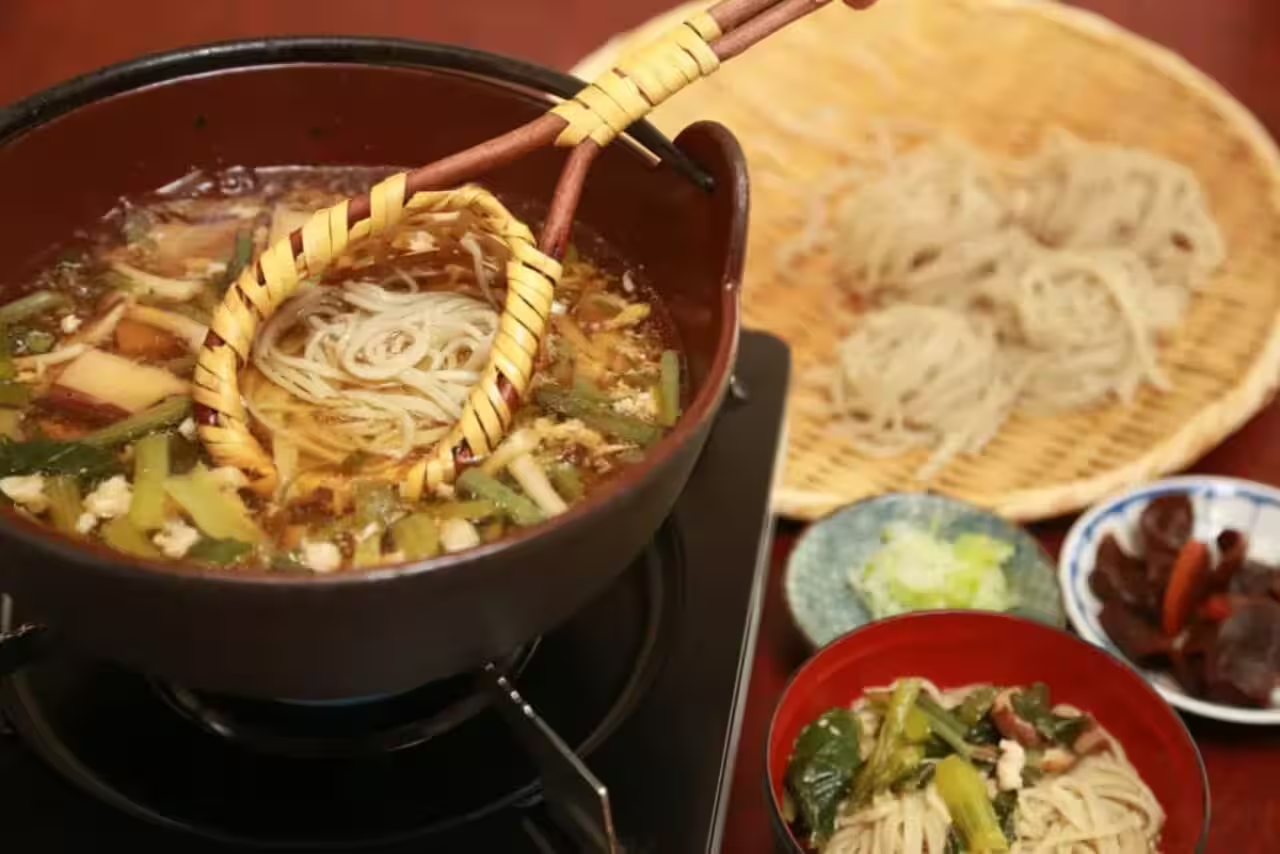
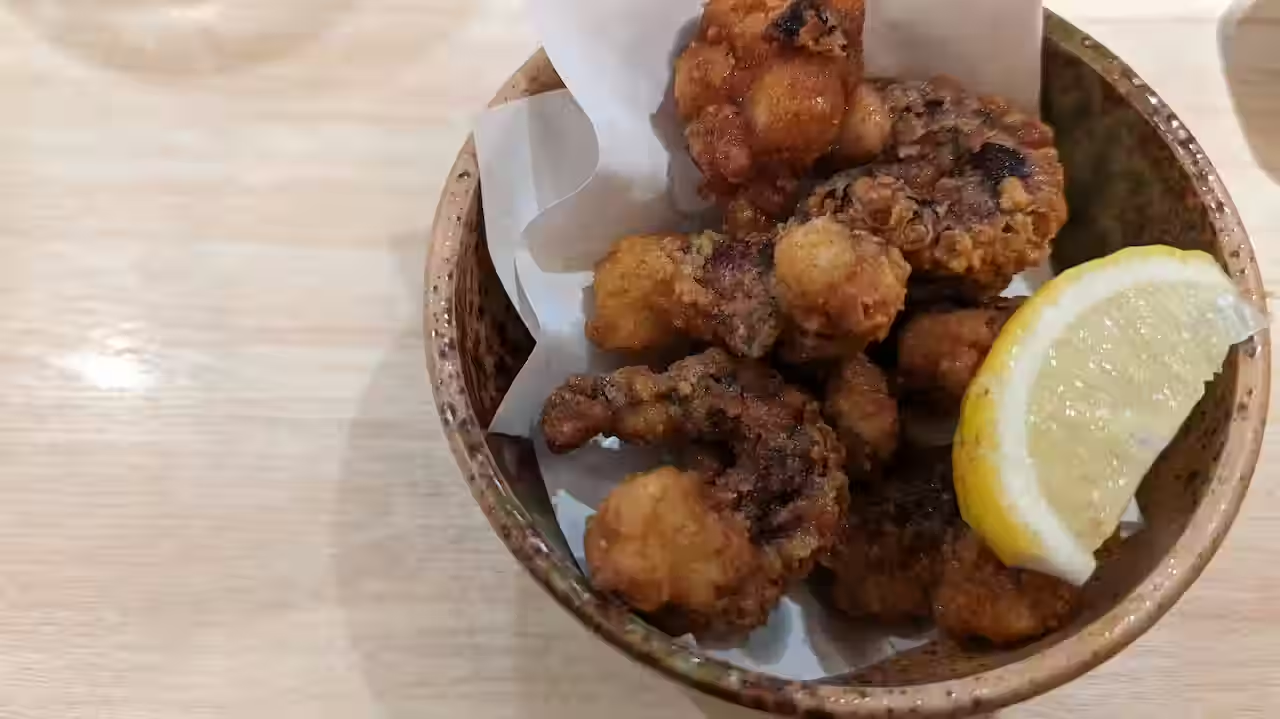

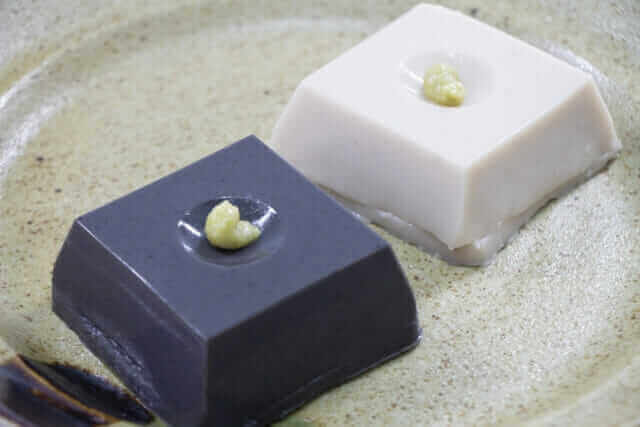
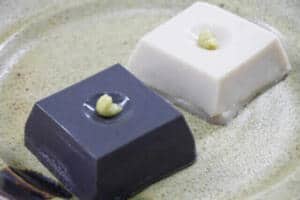
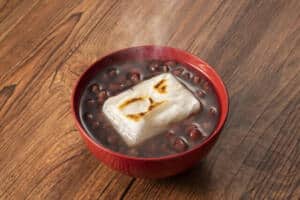
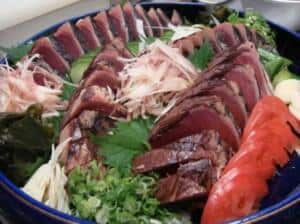
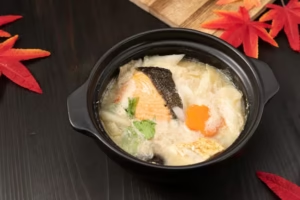

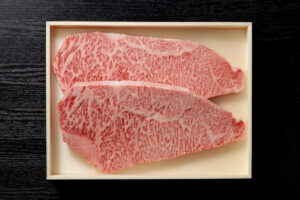
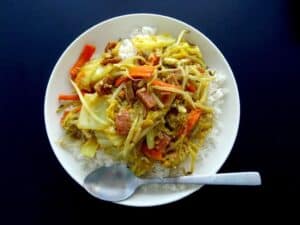

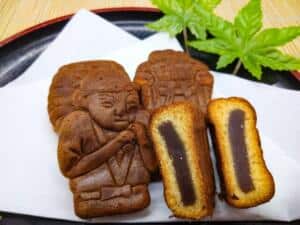
Comments